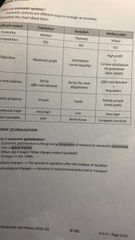- Barajar
ActivarDesactivar
- Alphabetizar
ActivarDesactivar
- Frente Primero
ActivarDesactivar
- Ambos lados
ActivarDesactivar
- Leer
ActivarDesactivar
Leyendo...
Cómo estudiar sus tarjetas
Teclas de Derecha/Izquierda: Navegar entre tarjetas.tecla derechatecla izquierda
Teclas Arriba/Abajo: Colvea la carta entre frente y dorso.tecla abajotecla arriba
Tecla H: Muestra pista (3er lado).tecla h
Tecla N: Lea el texto en voz.tecla n
![]()
Boton play
![]()
Boton play
![]()
29 Cartas en este set
- Frente
- Atrás
- 3er lado (pista)
|
What is economic activity?
|
combination of tasks undertaken by people in order to obtain the goods required to meet their needs
|
Tasks
|
|
the 3 phases of economic activities
|
Production, Distribution, Consumption
|
PDC
|
|
Difference bt production of goods and provision of services
|
Goods: physical things
Services: non-physical |
Touch
|
|
Economic sectors
|
PRIMARY, extraction. Ex agriculture, livestock f, foresty fishing...
SECONDARY,transforming. Ex industry, mining, energy, construction... TERTIARY, services. Ex transport, tourism, trade, education, health care, banking |
Primary, secondary and tertiary
|
|
what are economic agents?
|
subjects responsable for under taking economic activity(people who participate in an economy)
|
|
|
The 3 main economic agents
|
Businesses, families and states
|
BFS
|
|
Function of public sector
|
the state and it offers public services, it builds infrastructures and grants subventions to families and businesses
|
State
|
|
Public sector finantion
|
Natural resources, labour force and capital
|
NLC
|
|
what is capital?
|
is the combination of non-natural resources needed to produce a good or to provide a service
|
non-natural
|
|
3 kinds of capital and their resources
|
Physical: Buildings, machinery, technology Human: Formation, experience Financial: bank accounts, stocks, other financial assets |
PHF
|
|
Difference bt labour force and human capital
|
Lf: workers
Hc: Knowledge(formation and experience) those people have |
Work and know
|
|
what is the production cost?
|
is the money needed to produce any good
|
goods
|
|
ingredients to produce goods o provide services
|
Natural resources, labour force and capital
|
3(NLC)
|
|
natural resources meaning
|
elements provided by nature with an economic use
|
elements
|
|
problems affecting natural resources
|
exhaustion, overuse and international or narional conflicts to get them
|
EOI(N)
|
|
in what depends on the production cost?
|
on the cost of the natural resources, the cost of labour force (salaries) and the cost of the capital
|
costs
|
|
what is the profit ?
|
is the extra money earned by the ones who produce a good, transport it or sell it
|
extra
|
|
what is a supply curve and a demand curve ?
|
S: if sellers expect prices will be high, they will produce more goods
D: if buyers consider prices are low they will buy more goods |
sellers and buyers
|
|
what is inflation
|
general rise of prices in an economy
|
|
|
what is the active population made up?
|
is formed by the people who have a paid job and the people who are looking for it
|
Paid
|
|
what are economic systems?
|

different ways to manage an economy
|
|
|
what is economic globalisation? year? changes?
|
is the growing integration of national economies into a global market, in 1990s
Political changes: the spread of capitalism after the collapse of socialism Technological changes: Advances in telecommunication and in transport |
|
|
what are custom tariffs
|
are taxes added by govermets to increase the price of goods produced abroad. This is carried out to protect their national companies, so they act as economic barriers
|
|
|
custom tariffs consecuences
|
are harmful for customers in a country, as the have to pay more money for goods.
Beneficial for companies as the have less competition in a certain country, but they are harmful for them if they want to sell their goods abroad Beneficial for workers bc their companies have less competition and the risk of losing their job is lower Custom tariff decreased since globalisation. Thanks to that is more international trade nowadays |
|
|
International organisations
|
World Trade Organisation: setting the trade rules amlng countries
World bank: technical help and financial help to eliminate extreme poverty in a long-term help International Monetary fund: Technical and financial help to mantain economoc stability in a short or medium-term |
Task
|
|
what is G-20 ?
|
G-20= G-8 + 11 energency countries + EU
is a forum to discuss global economic problems. It is formed by the G8 (the most powerful countries on Earth) 11 outstanding emerging economies and EU |
|
|
What are emerging economies?
|
are countries that grew more than the rest since globalisation started
|
|
|
What are the BRICS
|
Are the main emerging economies. This grupo is formed by Brazil, Russia, India, China and South Africa
|
|
|
What are regional power?
|
countries with a crear political economic or cultural incluence in their continents or areas. The best strategy to develop their areas is helping them develop first and, as a consequence the surrounding countries will do it too
|